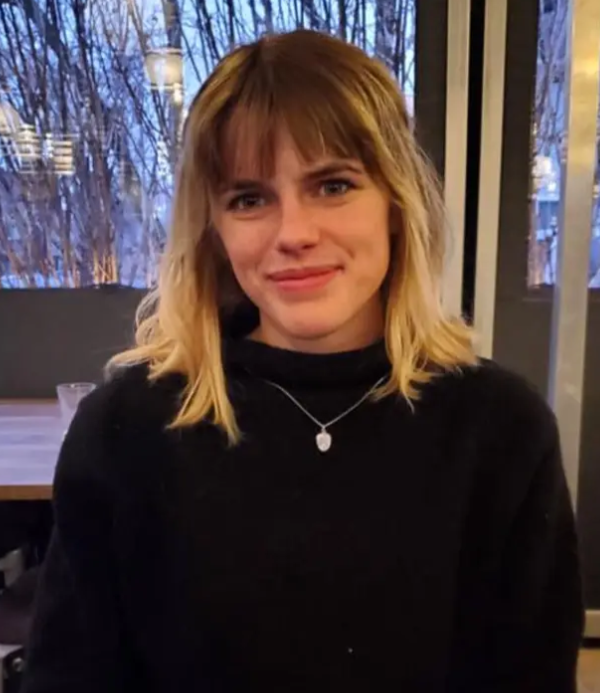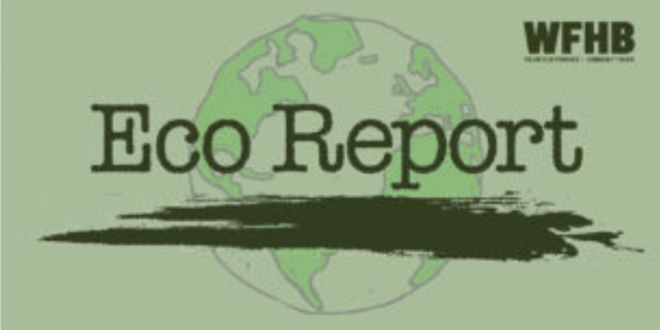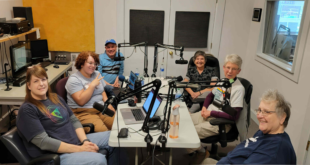Podcast: Play in new window | Download (Duration: 30:04 — 41.4MB)
Subscribe: RSS
| Hello and welcome to Eco-Report. For WFHB, I’m Julianna Dailey. And I’m Frank Marshalek. Coming up later in today’s program, Environmental Correspondent Zyro Roze will talk with Delaney Barber the Outreach, Energy and Climate Coordinator for the Hoosier Environmental Council. |
|
And now for your environmental reports: The following story is quite long, so we have broken it up into several segments, making it easier for you to follow and to help you understand how and why your elected legislators vote on environmental bills. According to the Lebanon Gazette, conflicts of interest in environmental bills continued in the 2023 legislative session. The author is Enrique Saenz, the Indiana Environmental Reporter. He moved from IU because the excellent program he did there did not receive funding. The experience WFHB has had with his stories is that they are reliable and thoroughly investigated. A joint investigation between the Indiana Environmental Reporter and the Arnolt Center for Investigative Journalism revealed some Indiana lawmakers stood to benefit financially from environmental legislation they introduced or supported. Indiana state law requires lawmakers and candidates for office to disclose financial interests from the previous year, but little in state law prevents legislators from introducing legislation that benefits them financially. The investigation found multiple potential conflicts of interest on both sides of the aisle. Statements of economic interest submitted by lawmakers in early 2023 indicate that financial links to bills introduced by lawmakers continued to exist in the latest legislative session, especially at crucial junctures in the lawmaking process. So, how’s it work? First up, Rewarding the Gatekeepers. Any member of the Indiana House of Representatives or Indiana Senate can sponsor a bill, but a bill in either chamber must pass through a series of gatekeepers in order to be considered by the full membership of that chamber. In the House of Representatives, the first hurdle to overcome is the Speaker of the House. The Speaker decides whether a bill is referred to a committee for review or dies immediately. What about the Speaker of the House? Indiana Speaker of the House Todd Huston disclosed owning a consulting firm with clients currently unrelated to the environment. Huston’s campaign received tens of thousands of dollars in contributions from companies regulated by the state’s environmental laws that would benefit from less protective legislation. Huston’s campaign received $564,000 in contributions to help with his re-election, including $10,000 from Duke Energy Corp.’s political action committee, $3,000 from American Electric Power and $2,500 from NextEra Energy, Inc. —Norm Holy |
| Next, we go to the Senate President Pro Tempore. In the Senate, the President Pro Tempore Rodric Bray decides whether a bill is referred to a committee or dies.
Bray reported that he had business interests in various utilities in Indiana and Michigan, including AES, parent company of AES Indiana; NiSource, Inc., parent company of the Northern Indiana Public Service Co.; and Michigan-bassed Detroit Edison, now known as DTE Energy. Bray also reported that one of his children has a business interest in Duke Energy Corp. Bray also received campaign contributions from regulated utilities and the fossil fuel industry, including $12,500 from NiSource, $10,000 from Duke Engergy Indiana, $3,000 from American Electric Power, $2,000 from CenterPoint Energy, Inc., $2,500 from Sunrise Coal LLC and $1,250 from Alliance Coal LLC. Neither Huston or Bray denied any bill assignment to a committee in the 2023 session. And we also have the Committee Chairs. Once bills are assigned to a committee, committee chairs decide whether or not to allow a bill to progress. A committee chair can decide not to schedule a bill for a hearing. If that happens, the bill is essentially dead. Most environmental bills go through the committees on Environmental Affairs, Natural Resources or Utilities, Energy and Telecommunications. —Norm Holy |
| So, what about those House Committees? House Committee on Environmental Affairs chair, Rep. Alan Morrison reported being employed by the alarm and security company, Mulhaupts and having no outside economic interests.
Morrison’s 2022 re-election campaign received contributions from Duke Energy, AES, AEP and NextEra Energy totaling $1,600. His campaign also received $2,000 from trade groups associated with land development, like the Indiana Builders PAC, Indiana Multifamily Housing PAC and Indiana Realtors Association. Morrison’s links to the home building industry drew scrutiny when he allowed Rep. Doug Miller, a real estate broker and member of the Indiana Builders Association, to introduce an amendment to an unrelated bll that sought to clamp down on the few remaining state protections for wetlands just hours before the committee was set to vote on the bill. Morrison refused to delay voting on the bill, despite requests from several committee members. The bill passed committee, but the wetlands language was eventually scrapped during the legislative process. House Committee on Natural Resources chair, Rep. Shane Lindauer reported having being employed at an assisted living facility and having economic interests tied to assisted living facilities, but his 2022 campaign received $2,500 from building PAC’s and $1,600 from utility companies. The contributions amounted to nearly a quarter of Lindauer’s pre-election contributions. Lindauer co-authored a successful bill that exempted forestry operations, which provide some of the lumber used for home building and industrial construction, from any regulation that required those operations from requiring waterway or watershed permits if the waterways do not have a watershed greater that 10 square miles. Prior to the new law, forestry operations needed a permit if they were along waterways with a drainage at least 1 square mile. —Norm Holy |
| The House Committee on Utilities, Energy and Telecommunications is chaired by Rep. Ed Soliday, a retired United Airlines pilot and Army veteran who flew helicopter combat missions during the Vietnam War.
Soliday reported deriving more than 25% of his income from investments managed by a financial firm. His reelection campaign received $16,000 from utilities and coal companies, $10,500 from Realtors and homebuilders, and $3,500 from clean energy companies. Soliday authored and sponsored more than a dozen bills associated with the environment, including several controversial bills that allow utility companies to pass on more costs to utility customers. House Enrolled Act 1417 and Senated Enrolled Act 180 allow utilities to pass on the cost of coal ash cleanups and other business costs to customers, essentially shielding companies from the costs of past financial decisions. Soliday-authored bills also eliminated competitive bidding for electric transmission lines, allowed natural gas-fired power plants to qualify for financial benefits reserved for clean energy projects and slowed the adoption of utility-scale battery systems for renewable energy by requiring the system owners to get construction approval from the Indiana Department of Homeland Security to its usual permitting process. —Norm Holy |
| And last, we have the Senate Committees. The Senate Committee on the Environment is chaired by Sen. Rick Niemeyer, who reported holding an interest in his auction and realty service company. Niemeyer’s re-election committee received $4,500 from Realtors and Homebuilders, and $2,000 from energy companies.
As committee chair, Niemeyer decided not to hear a bill establishing guidelines for beneficial use of coal ash and prevented a vote on a bill establishing a climate solutions task force in the state. The Senate Committee on Natural Resources is chaired by Sen. Susan Glick, an attorney from Lagrange with no reported economic interests. Glick’s re-election committee received $3,000 from BP North America, Inc. and received $1,000 from forestry associations. The committee’s ranking member, Sen. Jean Leising, received campaign contributions from 10 separate utilities and energy suppliers totaling $8,850 and $1,000 from homebuilding PACs. Leising introduced legislation that makes it more difficult for utilities to retire coal-fired power plants, eliminated a requirement for floodplain administrators to use “best floodplain mapping data” for construction permitting she voted for the previous year and co-authored a bill that would expand the number of small modular nuclear reactors that would qualify as a clean energy project in the state. The Senate Committee on Utilities is chaired by Bloomington attorney, Sen. Eric Koch. In his 20-page statement of economic interest, Koch has reported having hundreds of investment, including many in oil, gas and related sectors, industries directly affected by Koch’s decisions as committee chair. Koch states that his are passive investments with no stock management participation, but his decisions could potentially be making him money. Kosh’s re-election committee has also received more than $24,000 in contributions from energy-related industries in 2022 alone. Koch authored legislation benefitting fossil fuels and renewable energy in 2023. There are no reports of Senator Yoder or Representative Pierce receiving monies from corporations. And, now you know why Indiana doesn’t care about the environment. —Norm Holy |
And now, we go to Environmental Correspondent Zyro Roze as he explores a statewide Community Solar initiative being advanced by a coalition of environmental organizations as well as some of the effects of Climate Change in Indiana with Delaney Barber of the Hoosier Environmental Council.  |
| For Eco-Report, I am Julianna Dailey. And, I am Frank Marshalek. Are you looking for a way to make a difference on environmental issues? Here at EcoReport we are currently looking for reporters, engineers, and segment producers. Our goal is to report facts on how we’re all affected by global climate disruption and the ongoing assaults on our air, land and water.
We also celebrate ecologists, tree huggers, soil builders and an assortment of champions who actively protect and restore our natural world, particularly those who are active in south central Indiana. All levels of experience and all ages are welcome, and we provide the training you’ll need. W-F-H-B also offers internships. To volunteer for Eco-Report, give us a call at (812) 323-1200, or e-mail us at: [email protected]. |
|
And now for some upcoming events: Enjoy a Full Moon Hike around Lake Ogle at Brown County State Park on Saturday, July 29th, from 9 to 10 pm. The Sturgeon Full Moon is considered a supermoon. You will hike Trail 7 as you learn the history and folklore of the Sturgeon Full Moon and what a supermoon is. |
| Spring Mill State Park is having a Hoo Goes There? Hike on Saturday, July 29th, from 10 to 11 pm. Meet at the Tulip Poplar Shelter to learn all about owls. You will hike along Trail 7 while trying to hear a few of the owls in the wild. |
| Learn all about the Marvelous Monarchs at Spring Mill State Park on Wednesday, August 2nd, from 2 to 2:30 pm. Meet Sydney at the Lakeview Activity Center to learn about the life cycle of the Monarch Butterfly and what you can do to encourage them into your yard. |
| Sycamore Land Trust is hosting a Wildflower Meadow Preserve-A-Preserve Volunteer Weed Wrangle at the Touch the Earth Natural Area in Bartholomew County on Friday, August 4th, from 8 to 11 am. While pulling weeds, learn how to identify and control invasive plants. RSVP to sycamorelandtrust.org. |
| Is it a Frog or a Toad? Learn the differences between frogs and toads at the Paynetown State Recreation Area at Monroe Lake on Friday, August 4th, from 6:30 to 8:30 pm. Meet at the Campground where you will also make a froggy craft. |
| And that wraps up our show for this week. EcoReport is brought to you in part by M-P-I Solar, a Bloomington business specializing in solar hot water, solar electricity and solar hot air systems. M-P-I Solar designs and installs solar power generation systems that encourage independence and individual responsibility. Found locally at 812-334-4003 and on the Web at M-P-I solar energy dot com. |
| This week’s headlines were written by Norm Holy. Today’s news feature was produced by Zyro Roze and edited by Noelle Herhusky-Schneider. Julianna Dailey assembled the script which was edited by Zyro Roze. Julianna Dailey compiled our events calendar. Kade Young and Noelle Herhusky-Schneider produced today’s show. Branden Blewett is our engineer. |
| For WFHB, I’m Julianna Dailey. And I am Frank Marshalek. And this is Eco-Report. |
 WFHB Bloomington Community Radio
WFHB Bloomington Community Radio


